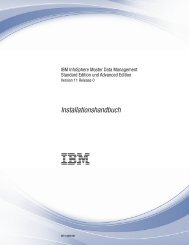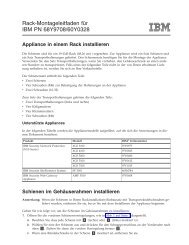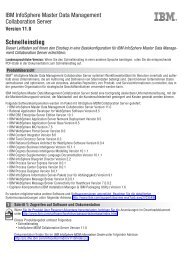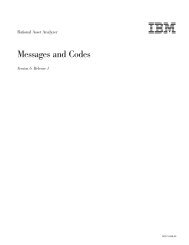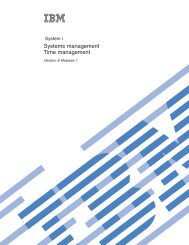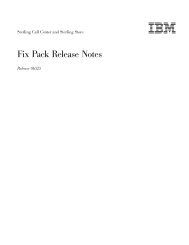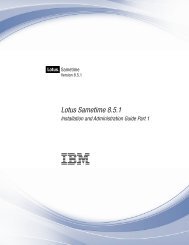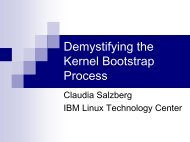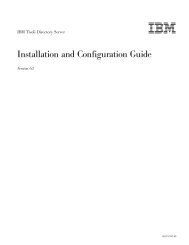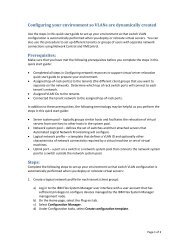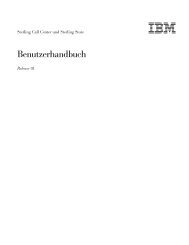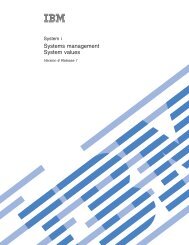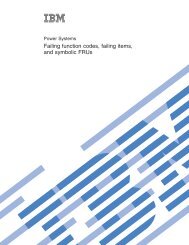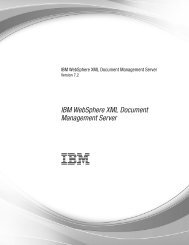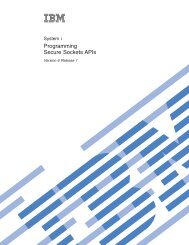- Page 1:
IBM Tivoli NetView for z/OS Version
- Page 4 and 5:
Note Before using this information
- Page 6 and 7:
| PIPE CZR . . . . . . . . . . . .
- Page 8 and 9:
Querying a Database and Formatting
- Page 10 and 11:
viii Programming: Pipes
- Page 12 and 13:
| | | x Programming: Pipes v Instal
- Page 14 and 15:
xii Programming: Pipes IBM Tivoli N
- Page 16 and 17:
Downloads Support information xiv P
- Page 18 and 19:
xvi Programming: Pipes Symbols The
- Page 20 and 21:
►► COMMAND_NAME KEYWORD1 KEYWOR
- Page 22 and 23:
Introduction and Concepts Pipeline
- Page 24 and 25:
Introduction and Concepts Stage Inp
- Page 26 and 27:
Introduction and Concepts 6 Program
- Page 28 and 29:
Introduction and Concepts 8 Program
- Page 30 and 31:
Introduction and Concepts Stages 10
- Page 32 and 33:
Introduction and Concepts The LOCAT
- Page 34 and 35:
Introduction and Concepts 14 Progra
- Page 36 and 37:
Introduction and Concepts 16 Progra
- Page 38 and 39:
18 Programming: Pipes WISHCMD is pr
- Page 40 and 41:
Pipeline Stages and Syntax PIPE (NC
- Page 42 and 43:
Pipeline Stages and Syntax 22 Progr
- Page 44 and 45:
Pipeline Stages and Syntax Examples
- Page 46 and 47:
Pipeline Stages and Syntax Table 2.
- Page 48 and 49:
PIPE APPEND Examples 28 Programming
- Page 50 and 51: PIPE BETWEEN NOINCL Specifies that
- Page 52 and 53: PIPE CASEI 32 Programming: Pipes NE
- Page 54 and 55: PIPE CHANGE Streams 34 Programming:
- Page 56 and 57: PIPE CHANGE 36 Programming: Pipes E
- Page 58 and 59: PIPE CHOP /string/ A character stri
- Page 60 and 61: PIPE COLLECT Streams 40 Programming
- Page 62 and 63: PIPE COLLECT Examples 42 Programmin
- Page 64 and 65: PIPE CONSOLE PIPE CONSOLE Syntax Sy
- Page 66 and 67: PIPE CONSOLE 46 Programming: Pipes
- Page 68 and 69: PIPE COREVENT Examples 48 Programmi
- Page 70 and 71: PIPE CORRCMD PIPE CORRCMD Syntax Sy
- Page 72 and 73: PIPE CORRCMD v When RMTCMD or servi
- Page 74 and 75: PIPE CORRWAIT PIPE CORRWAIT Syntax
- Page 76 and 77: PIPE CORRWAIT 56 Programming: Pipes
- Page 78 and 79: PIPE CORRWAIT 58 Programming: Pipes
- Page 80 and 81: PIPE COUNT 60 Programming: Pipes Op
- Page 82 and 83: PIPE COUNT 62 Programming: Pipes In
- Page 84 and 85: PIPE CPDOMAIN v CPDOMAIN produces a
- Page 86 and 87: PIPE CZR 66 Programming: Pipes Oper
- Page 88 and 89: PIPE DELDUPES PIPE DELDUPES Syntax
- Page 90 and 91: PIPE DELDUPES 70 Programming: Pipes
- Page 92 and 93: PIPE DROP PIPE DROP Syntax DROP: DR
- Page 94 and 95: PIPE DUPLICAT PIPE DUPLICAT Syntax
- Page 96 and 97: PIPE EDIT PIPE EDIT Syntax 76 Progr
- Page 98 and 99: PIPE EDIT 78 Programming: Pipes Loc
- Page 102 and 103: PIPE EDIT 82 Programming: Pipes Inp
- Page 104 and 105: PIPE EDIT 84 Programming: Pipes Tab
- Page 106 and 107: PIPE EDIT 86 Programming: Pipes Tab
- Page 108 and 109: PIPE EDIT 88 Programming: Pipes Tab
- Page 110 and 111: PIPE EDIT 90 Programming: Pipes Tab
- Page 112 and 113: PIPE EDIT Streams 92 Programming: P
- Page 114 and 115: PIPE EDIT 94 Programming: Pipes If
- Page 116 and 117: PIPE EDIT 96 Programming: Pipes Not
- Page 118 and 119: PIPE EDIT 98 Programming: Pipes exa
- Page 120 and 121: PIPE EDIT 100 Programming: Pipes TO
- Page 122 and 123: PIPE EDIT 102 Programming: Pipes *
- Page 124 and 125: PIPE EDIT 104 Programming: Pipes 2.
- Page 126 and 127: PIPE EDIT 106 Programming: Pipes IF
- Page 128 and 129: PIPE EDIT 108 Programming: Pipes SE
- Page 130 and 131: PIPE EDIT 110 Programming: Pipes B2
- Page 132 and 133: PIPE EDIT 112 Programming: Pipes C2
- Page 134 and 135: PIPE EDIT 114 Programming: Pipes JO
- Page 136 and 137: PIPE EDIT 116 Programming: Pipes ZD
- Page 138 and 139: PIPE EDIT 118 Programming: Pipes NE
- Page 140 and 141: PIPE EDIT 120 Programming: Pipes /S
- Page 142 and 143: PIPE ENVDATA Usage Notes Examples 1
- Page 144 and 145: PIPE EXPOSE FORCE Specifies that me
- Page 146 and 147: PIPE FANIN 126 Programming: Pipes U
- Page 148 and 149: PIPE FANINANY 128 Programming: Pipe
- Page 150 and 151:
PIPE FANOUT 130 Programming: Pipes
- Page 152 and 153:
PIPE FMTPACKT ► Synonyms STATS =S
- Page 154 and 155:
PIPE FMTPACKT 134 Programming: Pipe
- Page 156 and 157:
PIPE HELDMSG PIPE HELDMSG Syntax Sy
- Page 158 and 159:
PIPE HOLE PIPE HOLE Syntax HOLE: HO
- Page 160 and 161:
PIPE INSTORE PIPE INSTORE Syntax IN
- Page 162 and 163:
PIPE INSTORE Examples 142 Programmi
- Page 164 and 165:
PIPE INTERPRT Usage Notes Examples
- Page 166 and 167:
PIPE IPLOG PIPE IPLOG Syntax IPLOG:
- Page 168 and 169:
PIPE JOINCONT Usage Notes Examples
- Page 170 and 171:
PIPE KEEP PIPE KEEP Syntax 150 Prog
- Page 172 and 173:
PIPE KEEP Examples 152 Programming:
- Page 174 and 175:
PIPE LITERAL PIPE LITERAL Syntax LI
- Page 176 and 177:
PIPE LOCATE Operand Descriptions Us
- Page 178 and 179:
PIPE LOGTO HCYLOG Sends the message
- Page 180 and 181:
PIPE LOOKUP 160 Programming: Pipes
- Page 182 and 183:
PIPE LOOKUP 162 Programming: Pipes
- Page 184 and 185:
PIPE MEMLIST (DSN) Specifies that t
- Page 186 and 187:
PIPE MVS Examples 166 Programming:
- Page 188 and 189:
PIPE NETVIEW Usage Notes 168 Progra
- Page 190 and 191:
PIPE NETVIEW routine. The resume ro
- Page 192 and 193:
PIPE NLOCATE message is searched. I
- Page 194 and 195:
PIPE NLS 174 Programming: Pipes /*
- Page 196 and 197:
PIPE NOT 176 Programming: Pipes PIP
- Page 198 and 199:
PIPE NPDAEVD Examples 178 Programmi
- Page 200 and 201:
PIPE PERSIST Usage Notes 180 Progra
- Page 202 and 203:
PIPE PICK PIPE PICK Syntax PICK:
- Page 204 and 205:
PIPE PICK 184 Programming: Pipes
- Page 206 and 207:
PIPE PIPEND Examples 186 Programmin
- Page 208 and 209:
PIPE PPI Streams 188 Programming: P
- Page 210 and 211:
PIPE PPI 190 Programming: Pipes cod
- Page 212 and 213:
PIPE PPI 192 Programming: Pipes Not
- Page 214 and 215:
PIPE PRESATTR Termination Condition
- Page 216 and 217:
PIPE QSAM PIPE QSAM Syntax QSAM: QS
- Page 218 and 219:
PIPE QSAM 198 Programming: Pipes of
- Page 220 and 221:
PIPE QSAM 200 Programming: Pipes Ex
- Page 222 and 223:
PIPE REVERSE Usage Notes REVERSE ca
- Page 224 and 225:
PIPE ROUTE PIPE ROUTE Syntax ROUTE:
- Page 226 and 227:
PIPE ROUTE 206 Programming: Pipes
- Page 228 and 229:
PIPE SAFE Streams Stream Type Numbe
- Page 230 and 231:
PIPE SAFE 210 Programming: Pipes Wh
- Page 232 and 233:
PIPE SEPARATE SEQUENCE Specifies th
- Page 234 and 235:
PIPE SORT Usage Notes Examples 214
- Page 236 and 237:
PIPE SPLIT PIPE SPLIT Syntax SPLIT:
- Page 238 and 239:
PIPE SQL PIPE SQL Syntax 218 Progra
- Page 240 and 241:
PIPE SQL 220 Programming: Pipes are
- Page 242 and 243:
PIPE SQL 222 Programming: Pipes 5 T
- Page 244 and 245:
PIPE SQL 224 Programming: Pipes Whe
- Page 246 and 247:
PIPE STEM and PIPE $STEM PIPE STEM
- Page 248 and 249:
PIPE STEM and PIPE $STEM Usage Note
- Page 250 and 251:
PIPE STRIP PIPE STRIP Syntax STRIP:
- Page 252 and 253:
PIPE STRIP 232 Programming: Pipes /
- Page 254 and 255:
PIPE TAKE PIPE TAKE Syntax TAKE: TA
- Page 256 and 257:
PIPE TOSTRING PIPE TOSTRING Syntax
- Page 258 and 259:
PIPE TSO PIPE TSO Syntax 238 Progra
- Page 260 and 261:
PIPE TSO tso_command A TSO line mod
- Page 262 and 263:
PIPE TSO Examples 242 Programming:
- Page 264 and 265:
PIPE TSROUTE PIPE TSROUTE Syntax TS
- Page 266 and 267:
PIPE UNIX PIPE UNIX Syntax UNIX: UN
- Page 268 and 269:
PIPE UNIX 248 Programming: Pipes
- Page 270 and 271:
PIPE UNIX 250 Programming: Pipes Ne
- Page 272 and 273:
PIPE VAR and PIPE $VAR 252 Programm
- Page 274 and 275:
PIPE VARLOAD PIPE VARLOAD Syntax 25
- Page 276 and 277:
PIPE VARLOAD Examples 256 Programmi
- Page 278 and 279:
PIPE VARLOAD 258 Programming: Pipes
- Page 280 and 281:
PIPE VARLOAD Examples 260 Programmi
- Page 282 and 283:
PIPE VET Streams 262 Programming: P
- Page 284 and 285:
PIPE VET Usage Notes 264 Programmin
- Page 286 and 287:
PIPE VTAM PIPE VTAM Syntax VTAM: VT
- Page 288 and 289:
PIPE VTAM Examples 268 Programming:
- Page 290 and 291:
PIPE XCFMSG Examples 270 Programmin
- Page 292 and 293:
PIPE XCFQUERY Usage Notes Examples
- Page 294 and 295:
PIPE XCFTABLE PIPE XCFTABLE Syntax
- Page 296 and 297:
PIPE XLATE PIPE XLATE Syntax XLATE:
- Page 298 and 299:
PIPE < (From Disk) PIPE < (From Dis
- Page 300 and 301:
PIPE < (From Disk) Return Codes The
- Page 302 and 303:
PIPE > (To Disk) 282 Programming: P
- Page 304 and 305:
NetView Pipelines Device Drivers 28
- Page 306 and 307:
NetView Pipelines Device Drivers 28
- Page 308 and 309:
NetView Pipelines Device Drivers 28
- Page 310 and 311:
NetView Pipelines Device Drivers SD
- Page 312 and 313:
NetView Pipelines Device Drivers 29
- Page 314 and 315:
NetView Pipelines Device Drivers 29
- Page 316 and 317:
NetView Pipelines Device Drivers Th
- Page 318 and 319:
NetView Pipelines Device Drivers 29
- Page 320 and 321:
NetView Pipelines Device Drivers 30
- Page 322 and 323:
NetView Pipelines Device Drivers 30
- Page 324 and 325:
NetView Pipeline Filters 304 Progra
- Page 326 and 327:
NetView Pipeline Filters 306 Progra
- Page 328 and 329:
NetView Pipeline Filters 308 Progra
- Page 330 and 331:
NetView Pipeline Filters 310 Progra
- Page 332 and 333:
NetView Pipeline Filters 312 Progra
- Page 334 and 335:
NetView Pipeline Filters 314 Progra
- Page 336 and 337:
Full-Screen Automation 316 Programm
- Page 338 and 339:
Full-Screen Automation Virtual OSTs
- Page 340 and 341:
Full-Screen Automation ATTACH CMD D
- Page 342 and 343:
Full-Screen Automation 322 Programm
- Page 344 and 345:
Full-Screen Automation Handling Ret
- Page 346 and 347:
Full-Screen Automation 326 Programm
- Page 348 and 349:
Full-Screen Automation 328 Programm
- Page 350 and 351:
Full-Screen Automation NPDA Automat
- Page 352 and 353:
Full-Screen Automation 332 Programm
- Page 354 and 355:
Using Tivoli NetView for z/OS SQL S
- Page 356 and 357:
Using Tivoli NetView for z/OS SQL S
- Page 358 and 359:
Using Tivoli NetView for z/OS SQL S
- Page 360 and 361:
Using Tivoli NetView for z/OS SQL S
- Page 362 and 363:
REXX Access to VSAM Files Accessing
- Page 364 and 365:
REXX Access to VSAM Files 344 Progr
- Page 366 and 367:
Debugging NetView Pipelines Clogged
- Page 368 and 369:
Debugging NetView Pipelines 348 Pro
- Page 370 and 371:
Debugging NetView Pipelines Display
- Page 372 and 373:
352 Programming: Pipes
- Page 374 and 375:
Additional NetView Pipeline Example
- Page 376 and 377:
Additional NetView Pipeline Example
- Page 378 and 379:
Additional NetView Pipeline Example
- Page 380 and 381:
Additional NetView Pipeline Example
- Page 382 and 383:
362 Programming: Pipes incorporated
- Page 384 and 385:
364 Programming: Pipes
- Page 386 and 387:
DROP stage example, discarding mess
- Page 388 and 389:
LITERAL stage description 154 inser
- Page 390 and 391:
stages (continued) MEMLIST 163 MVS
- Page 392:
372 Programming: Pipes



